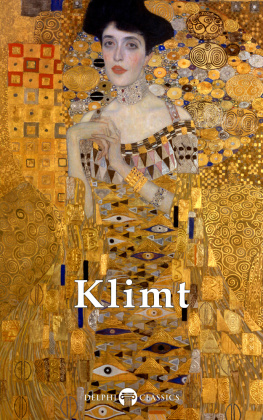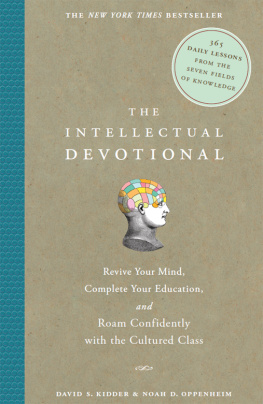Alan Wirzbicki
James Downs
This is the final volume of The Intellectual Devotional, a series we hope has made learning about a wide variety of subjects, from modern culture to American history to health, more accessible and entertaining for our thousands of readers. Weve chosen to conclude the series with a collection of short biographies, offering intimate portraits of some of the worlds most fascinating people, past and present.
Why end the series with biography? Throughout history, our world has been shaped by extraordinary personalities. The rise and fall of empires, the birth and evolution of religious communities, the expression of artistic genius, the advance of scientific discoveryits all been driven by exceptional individuals. What makes those individuals different from you and me? You hold the answers in your hands. In this volume, youll discover the fascinating stories of people who have made their mark on history, whether through high achievement, inspired thinking, or downright treachery.
The 365 entries are divided into the following categories:
L EADERS
Charismatic figures who mobilized the masses
P HILOSOPHERS
Deep thinkers who saw the world in new lights and helped others do the same
I NNOVATORS
The original thinkers behind mankinds greatest advances
V ILLAINS
Those who were vilified by their contemporaries or in historys judgment
A UTHORS AND A RTISTS
Creative spirits who expanded the boundaries of the human imagination
R EBELS AND R EFORMERS
Iconoclasts who overturned the existing social order, for better and worse
P REACHERS AND P ROPHETS
Spiritual visionaries who redefined our conception of a higher power
For a complete list of research sources, please visit www.theintellectualdevotional.com.
The ancient Egyptian pharaoh Khufu (c. 2609c. 2566 BC) envisioned his tomb as a towering limestone monument to his own greatness. The great pyramid in the desert, he hoped, would not only protect his soul during its journey to the afterlife, but also ensure that the world would never forget his twenty-three-year reign.
Sure enough, the world hasnt forgotten. Khufus name is forever linked with the enormous Great Pyramid of Giza, which it took an army of laborers nearly the pharaohs entire lifetime to complete. The pyramid, one of the Seven Wonders of the Ancient World, was the tallest man-made structure on Earth when it was completedand it would remain so for the next 3,000 years.
Aside from his enthusiasm for pyramids, however, little is known about Khufu. He was the son of King Sneferu and the second member of ancient Egypts Fourth Dynasty. He became pharaoh while still in his twenties, following Sneferus death. Khufu may have conducted some military expeditions to Nubia, south of Egypt, and Libya, to the west.
The religious significance of the pyramids is thought to stem from Egyptians beliefs about the afterlife. They considered pharaohs to be living gods whose entry into heaven after their deaths on Earth was eased by pyramids.
Khufus Great Pyramid was the first and largest such structure built at Giza. The pharaoh also built several smaller tombs for his wives and relatives, and two of his successors built their pyramids nearby. Most of the limestone used in the pyramids was quarried nearby, floated down the Nile on rafts, and then dragged up a massive ramp in enormous, three-ton blocks to the construction site. Other components were imported from as far away as Lebanon.
After his death at about age fifty, Khufu was mummified and buried in a tomb deep within the pyramid. Although the exterior layer of stonework casing was plundered over the millennia, the Great Pyramid remains largely intact, just as the pharaoh intended.
ADDITIONAL FACTS
- The Great Pyramid is made of roughly 2.3 million limestone blocks, some weighing as much as fifteen tons. The whole structure weighs about 6 million tons.
- Khufus full name was Khnum-Khufwy, meaning Khnum, protect me. Khnum was the ancient Egyptian god of the Nile River, which was the lifeblood of Egyptian agriculture and commerce.
- The Great Sphinx, a huge statue of a half-man, half-lion figure that stands near the Great Pyramid, is thought to have been constructed by Khufus son, the pharaoh Khafra (c. 25582532 BC).

TUESDAY, DAY 2
PHILOSOPHERS
In 585 BC, a scientist and philosopher in the Greek city of Miletus offered a bold prediction: On May 28 of that year, he said, there would be a total eclipse of the sun.
Such predictions, based on previous astronomical observations, were virtually unheard of in the ancient world. Few people in the Greek world believed that celestial events like eclipses could be foreseen; instead, they ascribed them to all-powerful gods. But the Miletian scientist, Thales (620546 BC), stood by his claim that human reason alone could be used to predict nature.
And indeed, on that day, a swath of whats now Turkey was cast into total darkness, just as Thales had prophesied. The eclipse terrified the Miletians, vindicated Thalesand, arguably, set in motion the history of Western science.
Prior to Thales, most Greeks considered religion and nature inseparable. Events like earthquakes and eclipses, they believed, happened when angry gods wanted to send a message to mankind. Greek mythology abounded with stories of the deities directly intervening on Earth.
By correctly predicting an eclipse, however, Thales profoundly altered the Greeks understanding of nature and of the value of knowledge. He also created the concept of philosophyderived from the Greek words for love of wisdomto describe those who sought to use reason to understand the world.
Thales was a trader and olive oil producer who had traveled to Egypt, where Miletus had a trading outpost, and to the Near East. He may also have traveled to Babylon, where he could have learned the Babylonian astronomical concepts that enabled him to predict the eclipse.
When he returned to Miletus, Thales founded a school of philosophy that would train several important Greek thinkers, including Anaximander (c. 610c. 546 BC) and Anaximenes (585525 BC). In addition to his scientific and philosophical work, Thales was a military advisor to several kings and played a role in preserving Miletian independence after the Persians defeated neighboring Lydia.
His death came suddenly at about age sixtyhe supposedly dropped dead while watching a gymnastics performance.
ADDITIONAL FACTS
- Thales believed that the world was made of water and that all forms of matter had started as water.
- The site of ancient Miletus is now the city of Milet, Turkey.
- According to one story, Thales once traveled to Egypt to study Egyptian geometry. He supposedly dazzled his hosts by correctly calculating the height of a pyramid based on the length of its shadow.
Many histories of medicine designate the ancient Greek doctor Hippocrates (c. 460c. 375 BC) the father of medicine. But more than 2,000 years before his birth, an Egyptian architect and priest, Imhotep, devised treatments for dozens of illnesses ranging from tuberculosis to toothaches to arthritis.













